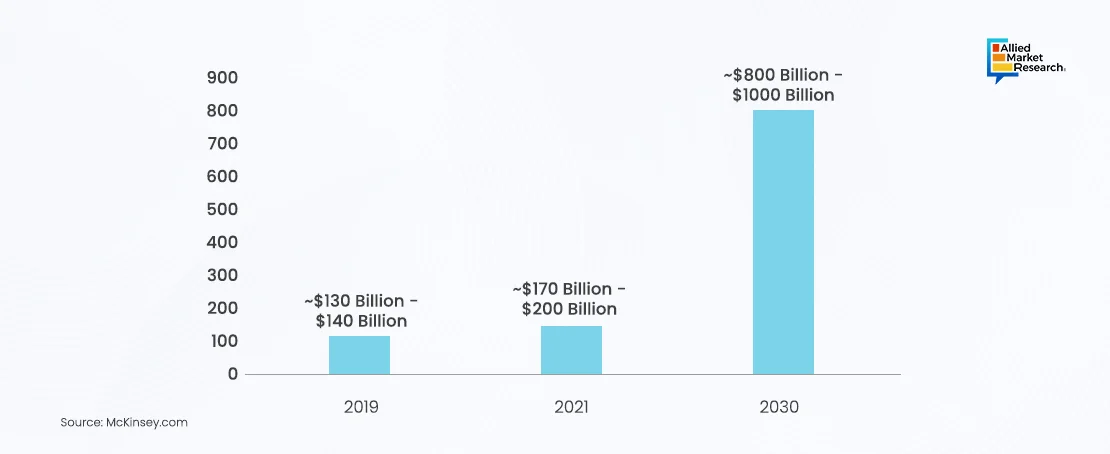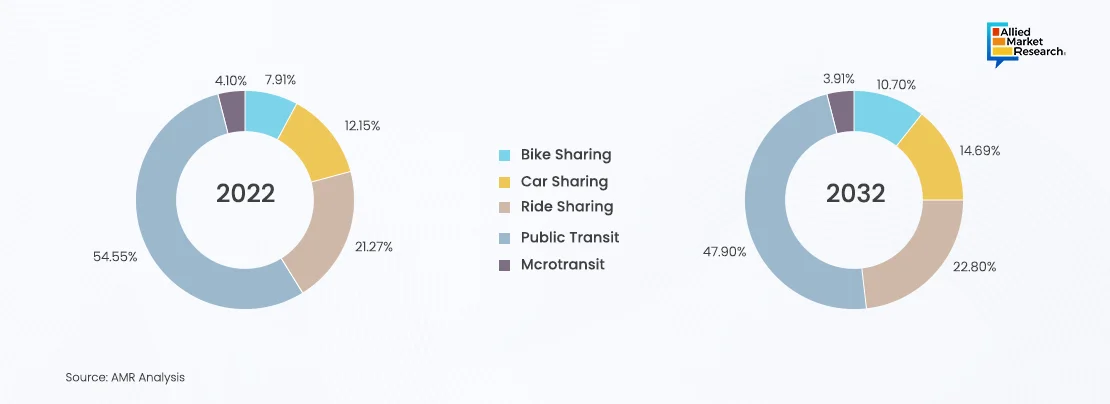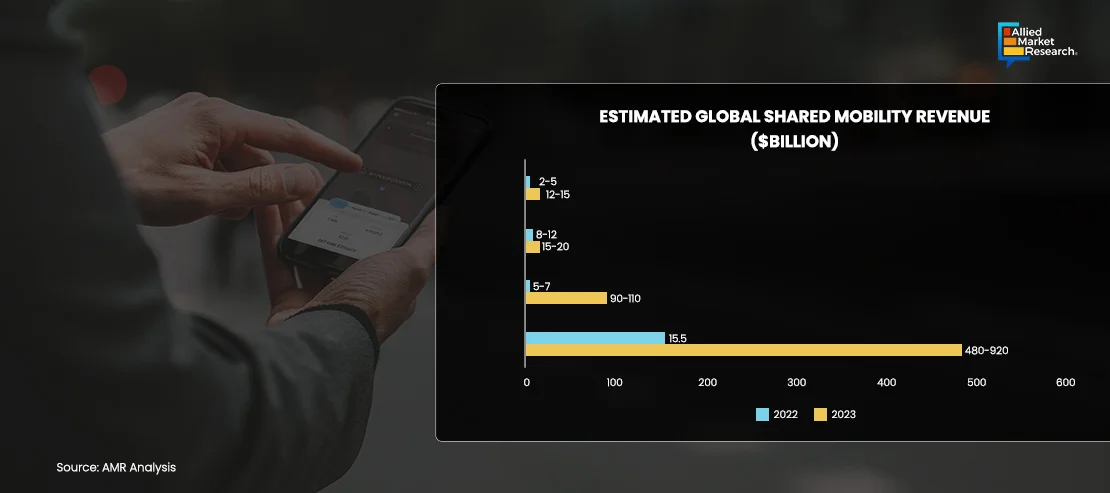Shared Mobility Solutions: Growth of Ridesharing, Car-Sharing, and Micro-Mobility Services

Shared mobility solutions are transforming the way people move in urban environments, offering convenient, cost-effective, and sustainable alternatives to traditional modes of transportation. This innovative approach to mobility encompasses a range of services, including ridesharing, bike-sharing, scooter-sharing, and car-sharing, all facilitated by digital platforms and smartphone apps. By leveraging the principles of resource sharing and efficient utilization, shared mobility services optimize transportation networks, reduce traffic congestion, and lower carbon emissions. They provide users with flexible and on-demand access to transportation options, allowing them to choose the most suitable mode for their needs at any given time.
Additionally, shared mobility solutions play a pivotal role in democratizing transportation, thereby enhancing accessibility for a wider demographic, particularly individuals lacking access to private vehicles. This inclusive approach promotes social equity and elevates urban livability by affording mobility alternatives to all inhabitants, irrespective of socioeconomic status or physical limitations. With ongoing urbanization and sustainability challenges, shared mobility solutions will become increasingly important in shaping urban transportation and improving the quality of life for many people worldwide. The ongoing developments in the industry have also fostered its growth. For instance, in April 2024, Yulu revealed the introduction of its cutting-edge two-wheeler models for shared mobility in Indore, in collaboration with the local company Yuva Mobility. This collaboration marks the launch of a franchise partner-led model in India's shared mobility sector, a strategic initiative under Yulu's Business Partner (YBP) program.
The visual representation above illustrates the dynamic evolution of the shared mobility industry, portraying its remarkable growth and increasing significance over the years. In 2019, the industry was worth about $130 to $140 billion. By 2021, it had grown even more, reaching between $170 to $200 billion, showing that it was expanding quickly and being used more widely.

By 2030, the industry is expected to undergo a huge change and could reach a value of nearly $1 trillion. This staggering escalation highlights not only the robust growth dynamics but also the growing importance of shared mobility in the global transportation ecosystem.
In addition, in 2022, Uber re-entered the shared mobility ecosystem to offer its services to customers across the globe. The company has additionally endorsed ridesharing/carpooling services to cater to a wide array of customers seeking cost-saving options, by allowing them to pay a fraction of the fare, thereby addressing ongoing challenges effectively.
The above illustration represents the distribution of service models within the shared mobility sector. Public transit, ride-hailing, and car sharing dominate the industry, fueled by a growing preference for these features within the shared mobility ecosystem.

Emerging Trends Influencing the Shared Mobility Sector
In the coming decade, the landscape of shared mobility services is expected to grow even more, encompassing a diverse array of offerings such as robo-taxis, robo-shuttles, and shared e-bikes. This expected expansion carries significant implications for policymakers, private businesses, and consumers, shaping the dynamics of urban transportation.
Firstly, a pivotal trend revolves around the potential shift from individual vehicle ownership towards pooled usage models. Rapid urbanization has increased congestion across cities globally, prompting a growing preference among passengers for shared rides. This inclination toward ridesharing is fueled by its cost-effectiveness—wherein multiple individuals split the fare—and its convenience, offering a door-to-door service without the hassle of driving. Concurrently, municipal authorities are implementing stringent measures to curtail private vehicle usage, including the establishment of car-free zones, congestion pricing schemes, and the reduction of parking infrastructure. Embracing sustainable and shared transportation methods shows potential for reducing environmental harm, easing traffic congestion, and maximizing road efficiency. For instance, in December 2023, India based CarDekho Group announced a merger with Revv to strengthen the shared mobility ecosystem. With this merger, CarDekho Group has taken a step toward building a one-stop solution for all automotive needs, creating a seamless customer experience.
Secondly, The impending commercialization of robo-taxis and robo-shuttles stands to democratize point-to-point travel, offering consumers more affordable alternatives to car ownership. For instance, in April, 2024, City of Detroit launched autonomous shuttle pilot project in collaboration with Bedrock, Michigan Central, and the State Office of Future Mobility and Electrification (OFME). This project deployed ‘Connect,’ an autonomous vehicle (AV) transit pilot aimed at advancing the city’s commitment to zero-emission public transportation. This change might make owning a car unnecessary for some groups and lessen the need for people to rely on their own vehicles. As a result, the value in the shared transportation system could focus more on shared modes like pooled rides and autonomous options such as robo-taxis and robo-shuttles. Moreover, futuristic developments have also paved a way for the betterment of the industry across the globe. This includes the announcement made by Nissan to roll out Level 4 mobility services in Japan by 2027.
Thirdly, a significant trend involves a pivot from larger to smaller vehicles, driven by the challenges of parking scarcity and traffic congestion in densely populated urban areas. Lots of people struggle to find parking and drive through busy streets when they commute every day. As a result, more people are preferring smaller, more agile transportation options for city travel. Moreover, companies such as Yulu bikes have been inclined toward upgrading from 30,000 vehicles to 100,000 vehicles by the end of the year.
These trends portray a major shift in city transportation toward shared, self-driving, and smaller vehicles. To shape the future of urban transport and improve city living, stakeholders must strategically adapt to these changes.
Government-Led Initiatives Driving toward Congestion-reducing Solutions
Governments around the world are leading efforts to reduce traffic congestion, bringing significant changes to how people commute and how markets operate. This movement, fueled by factors such as improved accessibility, decreased reliance on personal vehicles, and a shift in ownership patterns, profoundly impacts commuters' daily lives and the broader market landscape. Furthermore, the favorable government regulations have supported the growth of the industry across the globe. For instance, in March 2024, Indian government approved the policy to promote EV manufacturing in India. This policy aims to promote the manufacturing of EVs in the Indian ecosystem followed by the usage of these vehicles for personal & commercial purposes.

Case Study
Urban Mobility Tech Provides On-Demand Micro-Transit
Urban Mobility Tech, a Thai startup, provides on-demand micro-transit services tailored for smart cities. Their ridesharing platform, MuvMi, links travelers with local drivers, enabling the hire of auto rickshaws for a day with a single upfront payment. This service offers both tourists and locals an affordable, zero-emission transportation option. Urban Mobility Tech's provision of on-demand micro-transit represents a dynamic response to the evolving needs of urban transportation systems. By harnessing technology and innovative service models, Urban Mobility Tech has emerged as a key player in addressing the challenges of congestion, accessibility, and sustainability in urban areas.
At the core of Urban Mobility Tech, the approach is the concept of micro-transit, which offers flexible, on-demand transportation solutions tailored to the specific needs of commuters. Unlike traditional fixed-route transit systems, micro-transit services utilize dynamic routing algorithms and real-time data to optimize route efficiency and respond dynamically to passenger demand. This agile and adaptive approach enables Urban Mobility Tech to provide personalized, door-to-door transportation services that bridge the gap between traditional public transit and individual car ownership.
Urban Mobility Tech's on-demand micro-transit platform leverages advanced technology, including mobile apps, GPS tracking, and predictive analytics, to seamlessly connect passengers with nearby vehicles and coordinate efficient routes. Through intuitive smartphone applications, users can easily request rides, track vehicle locations in real-time, and receive estimated arrival times, thereby enhancing convenience and accessibility.
One of the key benefits of Urban Mobility Tech's micro-transit model is its ability to complement existing transit infrastructure and fill service gaps in underserved areas. By offering flexible, demand-responsive transportation options, Urban Mobility Tech expands mobility choices for residents, reduces reliance on private vehicles, and promotes multimodal transportation integration.
Moreover, Urban Mobility Tech's Tech's dedication to sustainability and environmental responsibility highlights its mission to cultivate cities that are not only more habitable but also prioritize eco-consciousness. By optimizing vehicle utilization, reducing congestion, and promoting shared mobility, micro-transit initiatives contribute to lower carbon emissions, improved air quality, and enhanced urban sustainability.
In addition to its tangible benefits for passengers and communities, Urban Mobility Tech's on-demand micro-transit solutions also hold promise for public and private sector stakeholders. Municipalities can leverage micro-transit services to enhance public transit offerings, improve transportation equity, and optimize resource allocation. Similarly, private companies can explore opportunities for partnership and collaboration with Urban Mobility Tech to provide employee transportation solutions, bring down parking demand, and perk up corporate social responsibility efforts.
In short, Urban Mobility Tech is pioneering on-demand micro-transit, showcasing a modern, tech-savvy, and eco-friendly approach to urban transportation. By reimagining how people move within cities, Urban Mobility Tech is helping to create more efficient, equitable, and environmentally conscious transportation systems for the future.
Future Landscape
The future of shared mobility solutions is bright, with continued innovation, expansion, and integration into urban transportation systems.
Integration with Public Transit: Shared mobility services are increasingly being integrated with public transit networks to provide seamless, multimodal transportation options for users. This integration enhances connectivity, extends the reach of public transportation, and improves overall mobility for residents.
Autonomous Vehicles: The development and deployment of autonomous vehicles have the potential to further revolutionize shared mobility by enabling cost-effective, on-demand transportation without the need for human drivers. AVs could enhance safety, efficiency, and accessibility while reducing operating costs for shared mobility providers.
Sustainability Initiatives: Shared mobility providers are investing in sustainability initiatives, including electrification of vehicle fleets, carbon offset programs, and partnerships with environmental organizations. These efforts demonstrate a commitment to reducing the environmental impact of shared transportation services and promoting sustainable mobility solutions.
Endnote
In the next 15 years, more people are expected to use shared transportation, like ride sharing and car sharing. This might slow down how many new cars are sold globally, but not stop it completely. In countries where many people are just starting to buy cars, like in emerging nations, car sales are still likely to go up despite shared mobility. However, if car companies and others in the transportation industry start getting ready for this change now, it might not be all bad for them. Even though ride-sharing and similar services are still new, some big car companies are already being outdone in value by these new companies, showing that investors believe in them.
Allied Market Research provides vendors with the knowledge and insights needed to explore the dynamic landscape of sharing mobility. By partnering with AMR, businesses gain access to comprehensive market intelligence, industry trends, and actionable strategies tailored to their specific needs. AMR's expertise enables them to make informed decisions, seize opportunities, and stay ahead of the competition in the sharing mobility space. Through our research and analysis, we help vendors with the understanding of consumer preferences, regulatory frameworks, and emerging technologies crucial for the successful integration of sharing mobility into their business models. For more details about technologies, innovations, and dynamics in the automotive & transportation industry, contact our specialists today!



